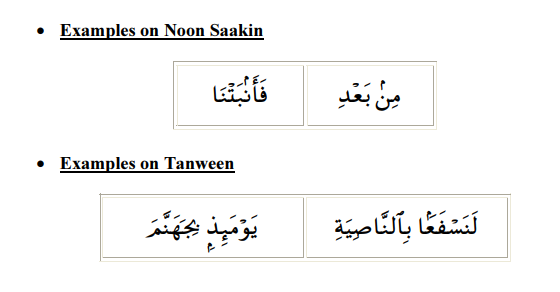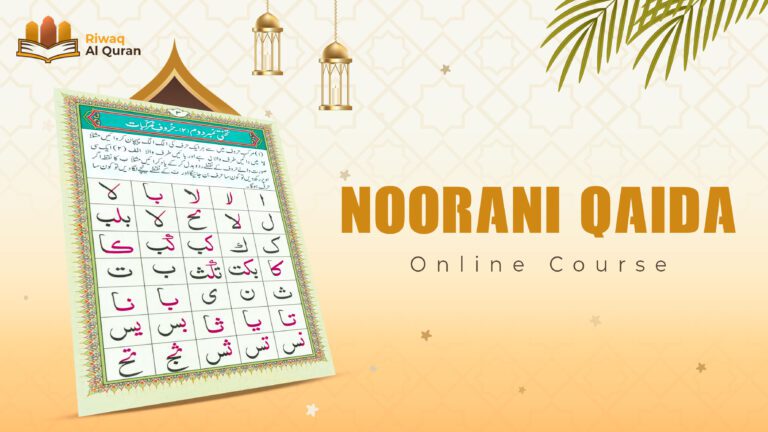Following up on our recent articles on Tajweed rules, we touched briefly upon the rules of Noon Sakinah and Tanween. Let’s delve even deeper to better understand the functions of Noon Sakinah and Tanween in Tajweed, especially Iqlab rules. Keep reading this post to learn what Iqlab in Tajweed is and what are its rules.
Table of Contents
What Is Iqlab
Noon Sakinah is the Noon (ن) without any vowel, namely Kasra كسرة, Fatha فتحة, and Dammah ضمة. It is a Noon with a Jazm or Sukoon on it. In the Holy Quran, the Noon Sakinah can be written with a Sukoon (سكون) over it or with nothing above it at all like (ن). Note that both have the same pronunciation and are called Noon Sakinah. Tanween is an additional Noon Sakinah used with the Kasra كسرة, Fatha فتحة, and Dammah ضمة.
There are four rules of Tanween and Noon Sakinah, namely Izhar Ikhfa Idgham, Iqlab. All these ones, including the Iqlab rules, rules apply to the characters that appear after Noon Sakinah and Tanween.
What Is Qalb Tajweed?
Qalb (Iqlab) is an important rule whose literal meaning is to change something. Basically, Iqlab rules mean to turn one letter into another. Since our topic is about the Noon Sakinah, we basically turn the Noon into another letter.
What Are the Letters of Iqlab?
Iqlab letters in Arabic or Iqlab words are not many. There is only one letter, i.e., Baa (ب).
What Is the Condition for Iqlab?
- If the letter Baa (ب) comes after Noon Sakinah or Tanween, then the reader will change the sound to Meem (م), and it will be recited with the sound between Idgham and Ikhfaa. The reason to do this is the easy pronunciation of silent Noon Sakinah and Tanween by transforming them into Meem since Meem and Baa share the same point of articulation, and Meem and Noon share the nasal sound.
- The Harakah (short vowel) of the letter Baa can be of any type.
- In many of the Quranic verses, the small letter ن appears over the letter م like نْۢ. This is where the Iqlab rules apply.
- This letter (م) is kind of different from the normal one as we prolong it for 2 counts when applying the Iqlab rules.
Iqlab Examples with Noon Sakinah
- منْ بَعْدِ
Iqlab Tanween Examples
- سَمِيعَاً بَصِيراً
In both examples, a little Meem appears on the letter before the letter Baa comes. Every time, the sound is changed to Meem with Ghunnah for 2 counts.
How to Pronounce Iqlab
How do you recite Iqlab? While reciting the Quran, when one’s eyes fall on the letter Noon or Tanween followed by the letter Baa, it is important to remember that it will not be pronounced but will be changed to the sound of Meem Sakinah with Ghunnah.
The reader should not close the lips completely and stress them while pronouncing Meem, but decrease its sound by making a gap between the lips to produce the sound of Ghunnah.

Importance of Iqlab
It goes without saying that the benefits of learning Tajweed are numerous. It should be a top priority for every Muslim to give it its due time and effort since the Holy Quran was revealed upon Prophet Muhammad PBUH through angel Jibreel in that way.
When it comes to the importance of Iqlab rules, we apply Iqlab because if you pronounce Noon followed by Baa, there would be some difficulty in pronouncing due to the distance of their exits in the mouth. Therefore, Noon is pronounced as Meem as Meem and Baa are proximate in their exits. Furthermore, Meem is proximate to Noon in Ghunnah. The interesting fact is that in English, Latin, and French languages, when the letter Noon and Baa come beside each other, they are pronounced as Meem and Baa.
Noon of Assertion and Iqlab
The Iqlab is applied in the pronunciation of this verse as follows:
(وجَعَلْنَا مِنْۢ بَیْنِ اَیْدِیْهِمْ سَدًّا وَّمِنْ خَلْفِهِمْ سَدًّا فَاَغْشَیْنٰهُمْ فَهُمْ لَا یُبْصِرُوْنَ) (Ya-Sin:9)
In this verse, the letter Noon is in “Min*Baiyni” and is followed by Baa at the beginning of the next word. And the (*) refers to the place of Iqlab. So, it is pronounced as “Mim-Baiyni” with the sound of Ghunnah.
Iqlab Examples in Quran

Following are some of the examples of Iqlab Tajweed rules in the Quran, where it can be seen that every time a small Meem occurs, the Iqlab rules apply, and it is because the Tanween or Noon Sakinah is followed by the letter Baa.
10 Examples of Iqlab in Quran
- (…وَاِنْ یَّخْذُلْكُمْ فَمَنْ ذَا الَّذِیْ یَنْصُرُكُمْ مِّنْۢ بَعْدِهٖؕ…) (Ali-Imran:160)
- (…وَ اللّٰهُ اَعْلَمُ بِاِیْمَانِكُمْؕ-بَعْضُكُمْ مِّنْۢ بَعْضٍۚ…) (An-Nisa:25)
- (وَاللّٰهُ یَسْمَعُ تَحَاوُرَكُمَاؕ-اِنَّ اللّٰهَ سَمِیْعٌۢ بَصِیْرٌ…) (Al-Mujadila:1)
- (فَاَذَّنَ مُؤَذِّنٌۢ بَیْنَهُمْ اَنْ لَّعْنَةُ اللّٰهِ عَلَى الظّٰلِمِیْنَۙ…) (Al-A’raf:44)
- (وَاَسِرُّوْا قَوْلَكُمْ اَوِ اجْهَرُوْا بِهٖؕ-اِنَّهٗ عَلِیْمٌۢ بِذَاتِ الصُّدُوْرِ) (Al-Mulk:13)
- (كَفٰى بِهٖ شَهِیْدًۢا بَیْنِیْ وَ بَیْنَكُمْؕ-وَهُوَ الْغَفُوْرُ الرَّحِیْمُ…) (Al-Ahqaf:8)
- (كَلَّا لَیُنْۢبَذَنَّ فِی الْحُطَمَةِ٘ۖ) (Al-Humazah:4)
- (اِذِ انْۢبَعَثَ اَشْقٰىهَا) (Ash-Shams:12)
- (وَاَنْتَ حِلٌّۢ بِهٰذَا الْبَلَدِۙ) (Al-Balad:2)
- (بِاَیِّ ذَنْۢبٍ قُتِلَتْۚ) (At-Takwir:9)
It is also advisable to check our article on the Meem Sakinah rules with examples, as well as the Laam Sakinah rules and how to master them for a deeper understanding of Tajweed lessons.
Learn Iqlab Rules with Us!
We hope that this article has helped you in your quest to learn the Holy Quran with Tajweed, especially the Iqlab rules. At Riwaq Al Quran, we all strive to facilitate your path to learn Arabic and the Quran with the right rules.
Therefore, we have specifically developed an interesting course for all those who wish to learn the science of Tajweed, including the Iqlab rules, and Learn Quran with Tajweed Online. Enroll in the course now for more explanation and await our regular articles for more Arabic and Tajweed lessons.
[ictabs alias=”best-online-tajweed-course”]



































